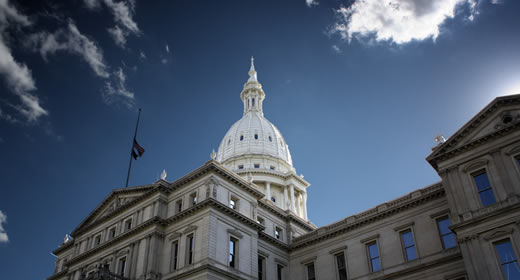
ANN ARBOR—Statewide, 70 percent of Michigan's local government officials believe the state government is taking too much decision-making authority away from local governments, according to a new survey by University of Michigan researchers.
The data come from the Michigan Public Policy Survey, a biannual poll of Michigan's 1,856 local governments. The survey received a 71 percent response rate with results from 1,315 jurisdictions.
"State government preemption of local authority is an increasingly important topic across the country," said Tom Ivacko, program manager at the Center for Local, State and Urban Policy at U-M's Ford School of Public Policy. "The Center for Media and Democracy reports that in each year since 2011, state preemption efforts have increased—not just in Michigan, but all across the U.S."
Recent high-profile state-level bans on local laws include those on the minimum wage, use of plastic shopping bags and gun regulation.
Interestingly, though, these are among the issues Michigan's local government leaders are comfortable having state government lead, in general. Local officials were not averse to all forms of state authority over issues impacting local government. When presented with eight broad policy areas, a majority believe state government should have jurisdiction in four:
- Anti-discrimination, including LGBTQ rights and equal opportunity laws. Seventy-four percent of local leaders said state government should have either most (42 percent) or complete (32 percent) authority.
- Social issues including public welfare, homelessness and gun regulation. Sixty-nine percent said state government should have most (45 percent) or complete (24 percent) authority.
- Business issues including minimum wage, plastic bag bans, puppy mill regulations and ride-sharing service. Sixty-six percent say state government should have most (47 percent) or complete (19 percent) authority.
- Environmental and natural resource issues including water, solid waste, agriculture and forestry regulations. Sixty percent say state government should have most (51 percent) or complete (9 percent) authority.
Local leaders do, however, believe local governments should take the lead in four other areas:
- Land use and planning, including zoning and permitting. Ninety-two percent said local governments should have most (43 percent) or complete (49 percent) authority.
- General economic development such as local business incentives and business-related infrastructure investments. Seventy-eight percent said local governments should have most (55 percent) or complete (23 percent) authority.
- Local finance and tax issues such as local option sales or income taxes and limits on millage rate limits. Seventy-five percent said local governments should have most (49 percent) or complete (26 percent) authority.
- Local government business operations including establishing their own requirements for open meetings and public notices. Sixty-two percent said local governments should have most (39 percent) or complete (23 percent) authority.
"Although the survey questions looked at broad areas rather than specific policy proposals, there appears to be widespread agreement about the proper division of state and local authority among officials from different jurisdiction types and sizes, and even across party lines," said Debra Horner, Michigan Public Policy Survey project manager.
Michigan News release by Nicole Casal Moore, senior public relations representative. Originally published at http://www.ns.umich.edu/new/releases/24904-local-views-on-state-governm…. Read the full June 2017 MPPS report here.